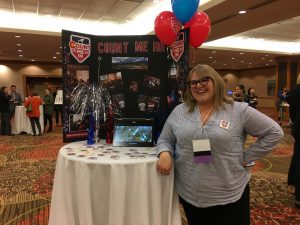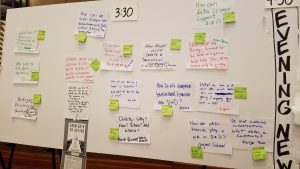January is finishing strong with this fantastic line-up of D&D online events! NCDDer Chris Santos-Lang let us know about his upcoming webinar on making research transparent that we encourage you to check out. There is a Common Ground for Action deliberation series running for three consecutive Saturdays from NCDD member National Issues Forums Institute, and more exciting webinars from NCDD member orgs, MetroQuest, Bridge Alliance, and Living Room Conversations!
Do you have a webinar or other event coming up that you’d like to share with the NCDD network? Please let us know in the comments section below or by emailing me at keiva[at]ncdd[dot]org, because we’d love to add it to the list!
Online Roundup: NIFI, CSA’s Ethics Working Group, Living Room Conversations, MetroQuest, Bridge Alliance

National Issues Forums Institute – January & February CGA Forum Series Deep Deliberation: Coming to America: Who Should We Welcome? What Should We Do?
Three consecutive Saturdays in Jan & Feb
Saturday, Jan 26th, Feb 2nd, Feb 9th
2pm Pacific, 5pm Eastern
Please join us for a deep dive into immigration reform using Common Ground for Action (CGA) online deliberation platform.
This will be one online forum set across three consecutive Saturdays in January and February in order have a deeper deliberative experience. Starting at 5pm ET on Saturday January 26th, February 2nd and February 9th, we will take an in-depth look at Coming to America: Who Should We Welcome? What Should We Do? On Jan 26th, we’ll discuss our personal stake and Option 1: Welcome Immigrants, Be a Beacon of Freedom. On February 2nd, we’ll deliberate Option 2: Enforce the Law, Be Fair to Those Who Follow the Rules and Option 3: Slow Down and Rebuild Our Common Bonds. On February 9th, we’ll begin making sense of our common ground, talk next steps, and the value of deliberation in these types of conversations. Plan to participate in all three forums for a highly deliberative and deep look at this wicked issue.
If you’ve never participated in a CGA forum, please watch the “How To Participate” video before joining. You can find the video link here: https://vimeo.com/99290801
If you haven’t had a chance to review the issue guide, you can find a downloadable PDF copy at the NIF website.: https://www.nifi.org/es/issue-guide/coming-america
If you’d like to watch the starter video before registering, you can view it here: https://vimeo.com/ondemand/comingtoamerica/256884446
REGISTER: www.nifi.org/en/events/jan-feb-cga-forum-series-deep-deliberation-coming-america-who-should-we-welcome-what-should
Ethics Working Group of the Citizen Science Association webinar – How to Make Your Research Transparent
* shared via NCDD member Chris Santos-Lang
Thursday, January 31st
9-10 am Pacific, 12-1 pm Eastern
A Webinar from CSA’s Ethics Working Group, presented by Chris Santos-Lang (Ethics Working Group Co-Chair)
This webinar is a practical how-to demonstrating some of the latest technologies developed to satisfy the transparency principles in the European Citizen Science Association’s Ten Principles of Citizen Science and the DIYbio Codes of Ethics. It will demonstrate two free solutions as examples: One is the Open Science Framework and the other is a homespun mixture of Google Drive, Google Docs, and FigShare. Both solutions leverage PubPeer, Creative Commons licenses, and research standards. This webinar also introduces the “APRICOT” mnemonic to map the range of transparency failures, and discusses the concerns that drive current negotiations between transparency and privacy.
About Chris: Chris Santos-Lang co-chairs the Ethics Working Group of the Citizen Science Association. He applies citizen science to ethics (e.g. studying moral psychology, machine ethics, and the sociology and political science of ethics).
If you experience any issues in registration, please email: info@citizenscience.org
REGISTER: https://citizenscience.member365.com/public/event/details/78a40bcdbcf4cbe1486b57996f0434fc336d9953/1
Living Room Conversations webinar – Guns & Responsibility

Tuesday, January 29th
12-1:30 pm Pacific, 3-4:30pm Eastern
Join us for a free online (using Zoom) Living Room Conversation on the topic of Guns & Responsibility Please see the conversation guide for this topic. Some of the questions explored include:
- What role have guns played in your life?
- Where did you learn about guns? And what did you learn?
- Are gun/second amendment issues very important to you?
Is there anything you would change about current gun laws or regulation in your state or at the federal level?
You will need a device with a webcam to participate (preferably a computer or tablet rather than a cell phone).
Please only sign up for a place in this conversation if you are 100% certain that you can join – and thank you – we have many folks waiting to have Living Room Conversations and hope to have 100% attendance. If you need to cancel please return to Eventbrite to cancel your ticket so someone on the waitlist may attend.
A link to join the conversation and additional details will be sent to you by no later than the day before the conversation. The conversation host is Harold R.
REGISTER: www.livingroomconversations.org/event/online-living-room-conversation-guns-responsibility/
MetroQuest webinar – “Public Engagement at All Scales | CMAP’s Winning Recipe”
 Wednesday, January 30th
Wednesday, January 30th
11 am Pacific | 12 pm Mountain | 1 pm Central | 2 pm Eastern (1 hour)
Educational Credit Available (APA AICP CM)
Complimentary (FREE)
For the Chicago Metropolitan Agency for Planning, award-winning comprehensive plans involve public engagement at all scales, collaboration with 284 communities, and a Local Technical Assistance program that’s admired nationally. Join us January 30th to get inspired!
CMAP Deputy Executive Director of Planning Stephane Phifer, Associate Outreach Planner Katanya Raby, and Senior Planner Lindsay Bayley will take you inside their local approach to online engagement for OnTo2050 – their comprehensive regional plan to improve quality of life and economic prosperity for 8.5 million people.
Public feedback was essential to exploring alternative futures for innovative transportation, climate change, walkable communities, a transformed economy, and constrained resources. You’ll learn how CMAP used a multi-phased approach to online engagement for a variety of local plans, including the downtown Aurora Master Plan.
Attend this complimentary 1-hour webinar to explore effective ways to:
- Engage inclusively to build inclusive plans
- Uncover the ideas, hopes, and concerns of residents
- Take a multi-phase approach to online engagement
- Think both locally and regionally for collaborative planning
This webinar will include a live Q&A session to help you prepare for 2019. Bring your public engagement questions for Stephane, Katanya, Lindsay, and Dave Biggs, Chief Engagement Officer at MetroQuest.
REGISTER: http://go.metroquest.com/Public-Engagement-at-All-Scales-CMAPs-Winning-Recipe.html
Bridge Alliance webinar – BridgeUSA Peer Learning Session – Achieving Diversity: An Example *this webinar is for Bridge Alliance members only – learn more here

Wednesday, January 30th
12 pm Pacific, 3 pm Eastern
Manu Meel will discuss how the Bridge Alliance and its members can achieve greater diversity in the revitalization movement. Specifically, he will present on:
- BridgeUSA’s lack of diverse leadership.
- The importance of diversity.
- How BridgeUSA is prioritizing diversity within its organization.
- What lessons other Bridge Alliance organizations can draw from its example.
We are very excited to host this event for Bridge Alliance member organizations through Zoom Video Conference, and we hope you will be able to join us.
If you wish to attend this event, please RSVP by January 24th.
RSVP: www.bridgealliancefund.us/bridgeusa_peer_learning_session
Living Room Conversations webinar – Mental Health

Thursday, January 31st
1:30-3 pm Pacific, 4:30-6 pm Eastern
Join us for a free online (using Zoom) Living Room Conversation on the topic of Mental Health. Please see the conversation guide for this topic. Some of the questions explored include:
- What experiences in your life, your work or your family inform your thinking about mental health?
- Is mental health an important issue in your community, and if so, why?
- In your experience, how are mental health issues affecting young people? (If you are a young person, how do mental health issues affect you and your peers?)
You will need a device with a webcam to participate (preferably a computer or tablet rather than a cell phone).
Please only sign up for a place in this conversation if you are 100% certain that you can join – and thank you – we have many folks waiting to have Living Room Conversations and hope to have 100% attendance. If you need to cancel please return to Eventbrite to cancel your ticket so someone on the waitlist may attend.
A link to join the conversation and additional details will be sent to you by no later than the day before the conversation. The conversation host is Lewis G.
REGISTER: www.livingroomconversations.org/event/online-living-room-conversation-mental-health-2/
Living Room Conversations webinar – Status & Privilege

Friday, February 1st
2-3:30 pm Pacific, 5-6:30 pm Eastern
Join us for a free online (using Zoom) Living Room Conversation on the topic of Status & Privilege. Please see the conversation guide for this topic. Some of the questions explored include:
- What status do you enjoy? Education, wealth, gender, race, etc?
- What are the privileges of your status?
- What do you value and how is that connected to your status or privilege?
You will need a device with a webcam to participate (preferably a computer or tablet rather than a cell phone).
Please only sign up for a place in this conversation if you are 100% certain that you can join – and thank you – we have many folks waiting to have Living Room Conversations and hope to have 100% attendance. If you need to cancel please return to Eventbrite to cancel your ticket so someone on the waitlist may attend.
A link to join the conversation and additional details will be sent to you by no later than the day before the conversation. The conversation host is Shay M.
REGISTER: www.livingroomconversations.org/event/online-living-room-conversation-status-privilege-3/


 How many conversations have you had this week about something you saw, on TV or happening in front if you? Vision is the primary way we sense and experience our world, and we are social beings who process information with others. We can easily leverage these tendencies if we want to inspire specific conversations in specific moments.
How many conversations have you had this week about something you saw, on TV or happening in front if you? Vision is the primary way we sense and experience our world, and we are social beings who process information with others. We can easily leverage these tendencies if we want to inspire specific conversations in specific moments.

 Wednesday, January 30th
Wednesday, January 30th




 Lots of gratitude is in store for those who helped make #NCDD2018 the dynamic event that it was! An immense THANK YOU to our conference sponsors (and D&D champions) for your generous support – you truly help drive this work and this field forward, and we couldn’t do this without you!
Lots of gratitude is in store for those who helped make #NCDD2018 the dynamic event that it was! An immense THANK YOU to our conference sponsors (and D&D champions) for your generous support – you truly help drive this work and this field forward, and we couldn’t do this without you!